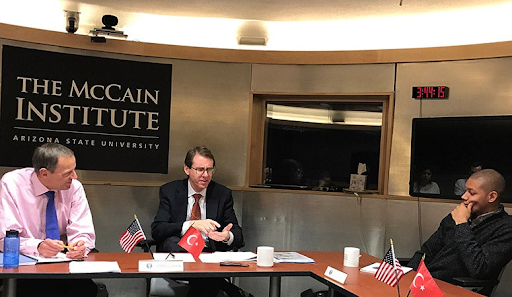
I’m what you might call an analyst. Actually you would be more likely to call me by the title on my law license. But I like to think of myself as an analyst because my entire job—and indeed, the job of every lawyer worth their salt—is to dispassionately review problems and propose workable solutions to them. This dispassionate mindset, coupled with the fact that I’m a nerd, makes it hard for me to talk about myself or anything outside of my work. But, here goes.
I decided to join the National Association for Black Engagement with Asia (NABEA) because it is a wonderful collection of people that provide a space to discuss issues I deeply care about with those of varied backgrounds and perspectives who share a rich ethnic history. In other words, I can have conversations about China with people who look like me, but don’t always think like me. And yes, that’s a good thing.
My membership in NABEA primarily stems from my fascination with China (and Asia more broadly), which started later than most of my peers. That is, if you consider 20 years old as being late. While international relations has always been interesting to me, my focus up until that point had been more on southwest Asia (Afghanistan and Iran) than the Indo-Pacific. National security, specifically cybersecurity and terrorism, was my passion, and these countries were the twin prisms through which I viewed it.
But with my first year of law school defined almost entirely by China, my trajectory changed. During my first semester, in 2015, Chinese General Secretary Xi Jinping and then-President Barack Obama agreed to prohibit “cyber-enabled theft of intellectual property.” I had countless debates with my colleagues and professors about whether the agreement would halt the billions of dollars in IP theft emanating from groups like PLA Unit 61398, and what it represented for U.S.-Chinese relations and cyberspace—was it a symbolic gesture, a path for developing effective international norms, or something else entirely?
This China focus continued into my second semester, when I learned about the competing claims over the South China Sea between a number of nations in the Indo-Pacific as part of my international law class. The technical yet politically-charged elements of the problem were both fascinating and deeply concerning, largely for the same reason: the geopolitical interplay between nations is complex—forming what one might call a “wicked” problem, a type I love to ponder—which has the potential to escalate into violence.
My twin interests in cybersecurity and (by then) China combined in my second year of law school as I tackled another “wicked” problem: the strategic relationship between the United States and China in the context of economic sanctions and persistent hacking. Out of this came an examination of presidential emergency powers in the fight against malicious cyber activity, and the pitfalls of defining those powers too broadly.
But China was still simply a familiar topic on which I could speak intelligently (depending on the issue) rather than an academic or professional center of gravity. The Justice Department changed that. While there, I devoured briefing materials, reports, books, and data on Chinese history, culture, politics, law, economic activity, and military innovation. I saw firsthand not only the professionalism and dedication of my colleagues, but also the manifold ways in which my China studies from law school have a real-world impact, especially when it comes to cybersecurity and counterintelligence.
I have never been to any country in Asia, though I do have a desire to see the continent, particularly China, up close. Unfortunately, my status as a government employee was one of the barriers to such travel, given the risks involved. Yet, absent such travel, I believe my (admittedly U.S.-centric) China experience is still useful. For one, I can more readily identify with those who have little understanding of China and want to know how to start learning from scratch. In addition, much of what has happened in U.S.-China relations in the past decade has a legal component—from economic sanctions against Chinese military companies and competing claims in the South China Sea, to the extraterritorial provisions of Beijing’s recently-passed National Security Law for Hong Kong and the question of whether the Chinese government’s oppressive policies targeting the Uighur ethnic minority group constitute genocide.
NABEA provides me with a safe avenue to examine these legal (and policy) issues amongst people who understand what it’s like to be a minority within a minority—black people who are interested in Asia. And it also provides me with a broader perspective. NABEA is a diverse group, not only in racial terms, but also in terms of professional and intellectual backgrounds. We are a group of lawyers, think tankers, journalists, analysts, authors, students, and engineers, among other professions. We also have unique and sometimes divergent thoughts on and approaches to China and Chinese issues.
To sum it all up, I joined NABEA because intellectual discussion about law and policy in the Indo-Pacific is something I deeply crave. I stay because I am able to glean so much more.
~~~~~~~~~~~~~~~~~~~~~~~~~~~~~~~~~~~~~~~~~~~~~~~~~~~~~~~~~~~~~~~~
If you identify as Black American or African-American, join our Slack community to connect with other Black Asia experts by filling out our Slack sign-up form! Also, fill out the Database sign-up form to be added to NABEA’s Database, a publicly accessible resource for institutions to find Black Americans across academia, government, and private sector industries who specialize in the Indo-Pacific.
If you do not identify as Black American, sign up for the listserv to receive newsletters and stay up-to-date on NABEA’s activities and programming. Also, please spread awareness by sending this information to any Black American, Asia specialists in your network.
